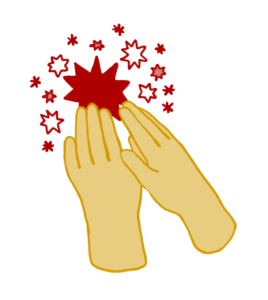“What That Means to Me” is a creative exploration that is expressed through dance, writing, film, and visual art. What began as a conversation between Rajiv Awasthi, Emily Goes, Rachel Ha-Eun Lee, and Riya Panjwani to celebrate and understand our Asian American experience, transitioned into a larger collaboration with Guru Ramanathan, Han Lee, Tuânminh Albert Đỗ, and Sally Chen.
The collaboration evolved into two things: a video that reclaims our Asian identity through poetry and dance, and a book that holds both beautiful illustrations and our original conversation. Emily and Rachel had two separate spoken word poems that were created in response to the rising awareness of Asian violence that reflected what they hoped for against the realities of racism towards Asians in America. Joining forces to integrate their poems and inspire movement, Bai-Ka joins the team as Minh Đỗ captures this moment on camera. And of course, this is all to Rajiv’s original music.
Our conversation turned to a book by way of Sally’s illustrations and Riya’s design. It encapsulated our experiences as Asians in America, as Asian American artists, and what we hope for society in the future. Guru and Han helped creatively and logistically develop the overall project, serving as editors on the book and helping produce the video alongside Bai-Ka.
Below is our book and transcript of the abridged conversation:
“If you can’t hear us, read our words.”
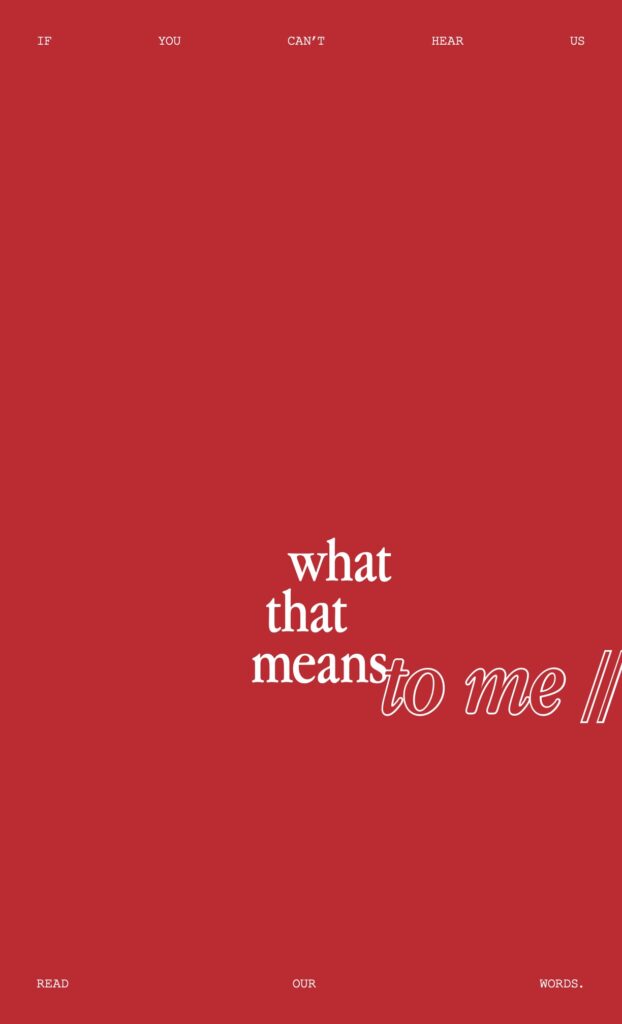
RACHEL LEE (RL): “I grew up being one of the only Asians in my community in Texas and that just says a lot about it in itself. I wanted to separate myself from being Asian as much as possible and felt rewarded when I was told, ‘Rachel, you’re so white.’ I refused to speak in Korean, even though my parents are both from Korea and mostly speak Korean to me at home. In dance competitions they wanted our hair and makeup to look the same but sometimes my hair wouldn’t fit, or the makeup wouldn’t work because I don’t have a crease in my eye. I physically could not make it look the same, and I was punished for that.
RIYA PANJWANI (RP): Specifically speaking as an Indian girl, I’m much hairier than the average white girl I guess, so you know, people would be like “look at your unibrow, your mustache” and I’m like, “Oh my god, great, I’m like 5-years-old, do you want me to start waxing this point?” So I think I worked hard to fit in [with white peers]. At some point it felt natural, but in the back of my head I knew I didn’t feel comfortable hanging out with these people. And then I went to a performing arts high school in Astoria, Queens and that was the best thing ever. It was so diverse and people from literally all over the city attended that school.
EMILY GOES (EG): I am from the area of East Side San Jose, near Milpitas, and that area, man, is a hub of Asian immigrants. I took for granted that I grew up in the ESSJ public school system surrounded by a lot of people that looked like me. Of course, as a mixed raced person, my proximity to whiteness was apparent and real. All my racialized friends considered me as white. That’s a whole other thing, am I white? I am not sure. And then all my white [theater] friends considered me Asian. I prided myself in being in those white spaces. Being able to pay for private school in Silicon Valley was the norm. White beauty standards were the norm. Whiteness was the norm for white people, but also a lot of non white people, including myself. I have a friend who said to me a couple years ago, “Sometimes I forget you’re a woman of color.”
RAJIV AWASTHI (RA): I wasn’t surrounded by people that looked like me, or had conversations like that. When I was in my teens, early in high school, I was like “I’ve gotta choose which crowd to run with. The white crowd, the Black crowd, the Latinx crowd, or just hang out in the physics room.” I didn’t have other choices. So in a way, the AAPI-ness didn’t really exist because I wasn’t interacting with other AAPI people outside of my home.
RL: Me neither! I’ve spent so much of my life sucking up to white people, because it works. Throughout my experience in the final years of high school and into college, I started to immerse myself in K-pop and tried to learn the language to speak to my grandparents. That’s so important to me. How have I gone my whole life and they’re like, strangers?
EG: I think we are the first generation to consider that assimilating to white America isn’t the move.
RP: I feel like if my parents don’t progress with society and learn about what’s going on and how it’s problematic, then they’re kind of stuck in the past, not really moving forward. And I think that it’s important that you help them take those steps forward and understand just what’s going on in the world and how we have to rethink the narrative that we’ve been told this whole time.
EG: Yes. My mom likes to describe how she has “Americanized” herself. I’ll catch her saying, “People think I’m American because I blend in with white people.” And I’m like, “Regardless of if you blend in’, you’re American.” My Mom will entertain my opinions but she is ultimately fine and proud of that assimilation. Our parents lived the lives that they lived and if they didn’t, we wouldn’t have the lives that we currently hold. Although, I very much grew up in a colorblind household. I recently realized that I really needed to unpack the feeling of being stuck between two different cultures with an immigrant mother who did what she needed to survive.
RL: I was also talking about this with my mom. As I was going through the hardships of the American school system, I never talked about it with my parents because I didn’t want them to think I was selfish or ungrateful. Maybe if we had these conversations, I would’ve felt being Asian as a strength of mine rather than a weakness. Finally this year I was able to perform a dance that was about taking back our Asian identity from how it has been appropriated. Whether or not we intentionally want to make it about our identity, when people see 3 Asian girls on stage dancing they’re going to assume it’s about our identity. And in my experience at NYU (New York University), based on how the faculty treated me, I very much question how much of my experience is because I belong here and how much is me just checking off a diversity quota.
RP: I think a lot of my friends of color are unlearning that too. We really want to work hard to figure out how we can have a seat at the table and what we can contribute and how we can get our work out there in an authentic way without it being kind of shadowed over. Honestly sometimes at FIT (Fashion Institute of Technology), just to pass the class, I’ll have to adjust my own style and fit into a mold that my teachers want. But I think it’s something I’ve been working hard to fight against, especially as I’m coming towards senior year where I want to find my own voice as an artist and figure out what my style is.
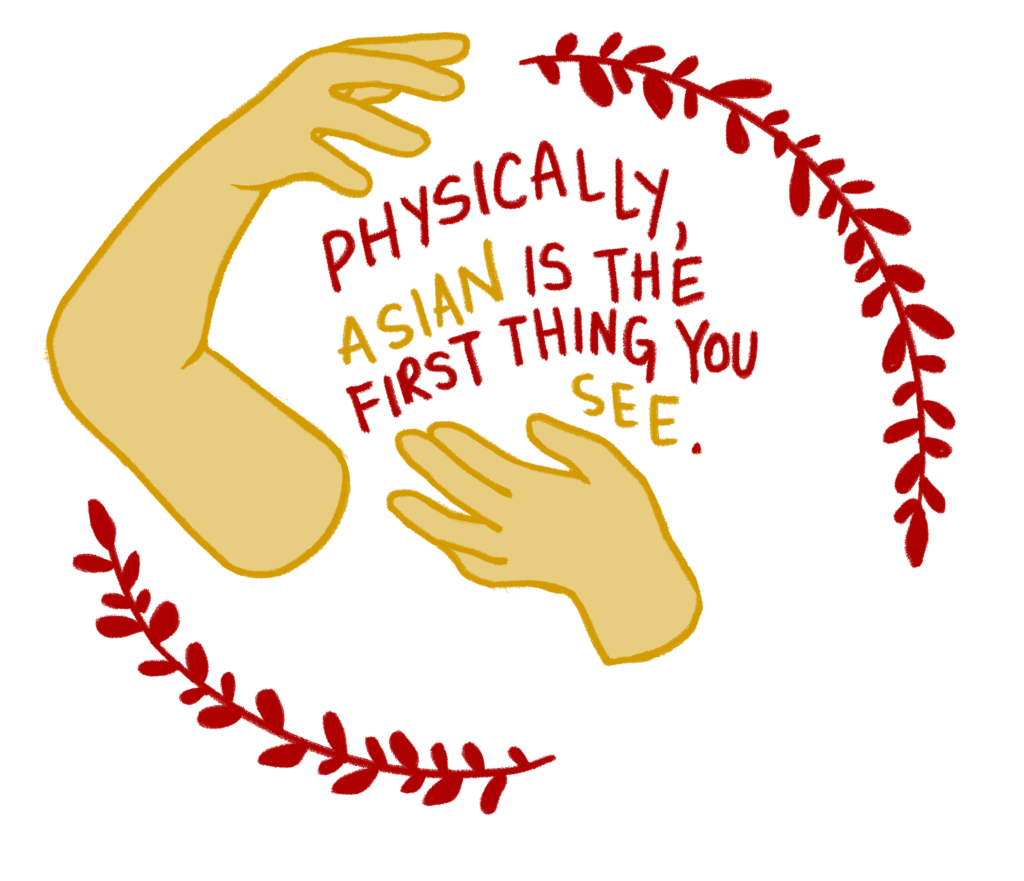
RA: I feel that. It took until coming to college where I even thought about what being an AAPI meant…if that means something. Because that concept was
in the back of my mind. And then all
of a sudden I come to college and I’m like “Oh, I’ve been checking Asian on this form, like the SAT form, the whole time” without realizing what that meant. And it’s something that I’ve started reckoning with but I don’t even really know that I have fully done that or like how to chart that progress.
EG: Whoa that’s so true, checking the box and not even clocking what that means. But same Rajiv, I never saw my identity as an asset until I got to college. In my year at NYU New Studio on Broadway, my program was nearly 70 people. Out of 70, 4 of us were Mixed Asian. MIXED Asian.
RL: Emily, do you ever feel pressured to only go for Asian roles? Also, because there were only 4 other Asian people in
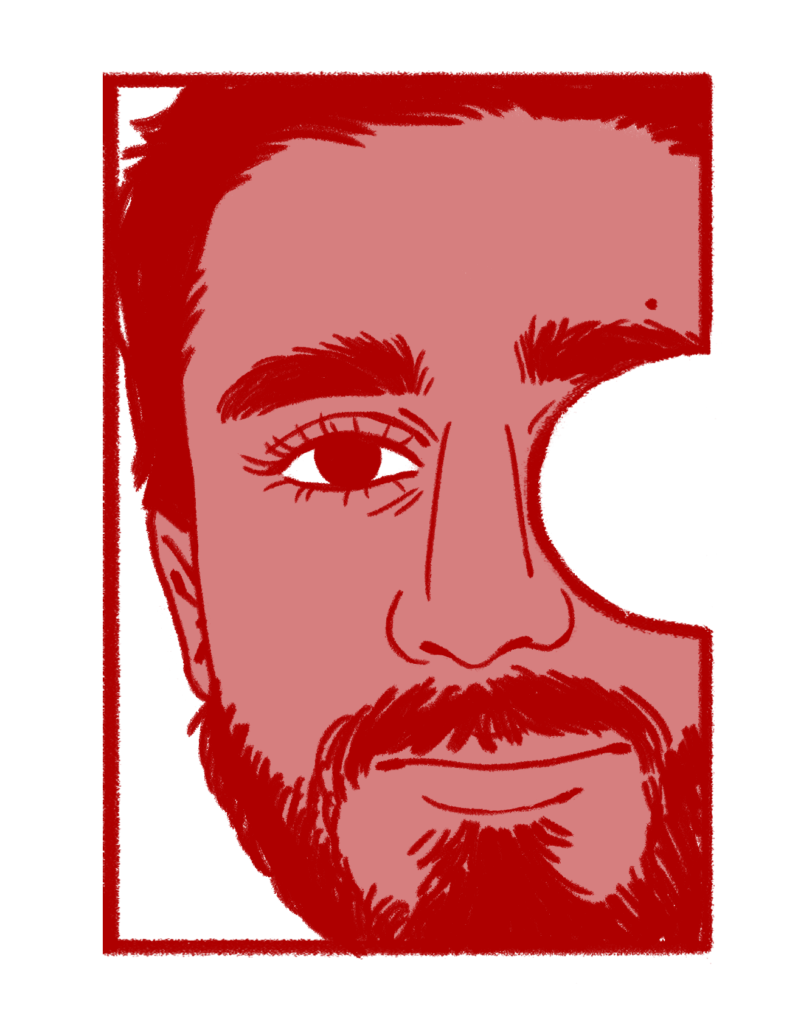
Musical Theatre with you, did you feel the need to be competitive since y’all might be going for the same token Asian role? Or what about everyone else? Do y’all ever feel pressured to bring your Asian-ness to your art?
EG: Within New Studio on Broadway, I never felt that competition. It’s easier to not give into a white narrative in spaces that you inhabit on a regular basis. I am more comfortable to disrupt that there than an audition room I am in for the first time. Which is another conversation that needs unpacking. But going back to NSB, there actually wasn’t much opportunity to compare because they often picked white shows and white people anyway. Bringing my “Asianess” to my work – outside of just being me – wasn’t explicitly an option.
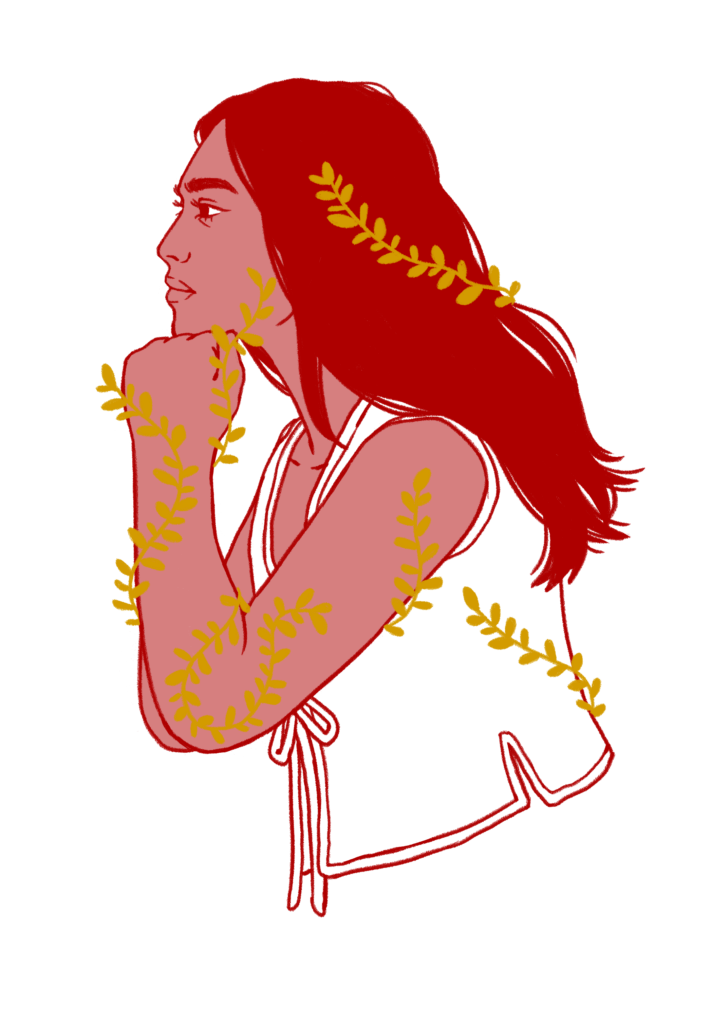
RA: I am trying to relieve myself of any pressure I feel to bring my Asiannness into my work. I think there’s times when I wished I knew more about my cultural background and the specificity of that, but I feel like that is part of bringing Asianness into my work on terms that I set for myself.
EG: Sometimes I feel that imposter syndrome because I don’t know as much about my Filipinx culture as another Filipinx probably does. I don’t speak Tagalog. I only know a few dishes like, adobo, tapsilog, kaldereta, lugao, halo halo. But hmm. Doesn’t make me less Filipinx, right?
RA: Right. The way I want to bring my Asianness to my work could be by sprinkling small details or mentions that are reflective of Indian culture, which could be something like a character playing tabla onstage or passing mentions of Hindu gods or something like that. And I think the opposite of making it on my own is when people say they wanna see more of my Indianness reflected in work. When I hear shit like that I’m hearing people say ‘if I can’t reduce you and your work down to your identity how will I understand it’ and it pisses me off a bit.
RL: Yeah, that is such a thing. Being Asian is such a range of different things. Clearly, with all of us talking today. But the term “Asian” is grouped into one Asian idea and seen within that model minority myth. And that adds pressure for me to always be perfect, do as instructed, and stay quiet.
RP: My parents have always had that mentality. Where they have to keep their head low and just survive. Especially after 9/11 where they were easily seen as targets, they are kind of just in survival mode and we just have to do as we’re told, and not really question or fight back the system in any way.
RL: It’s this thing where in a world ruled by white supremacy, what does it mean for us to stand up for ourselves? The few times I feel like I’ve stood up for myself, it’s been met with ignorance. What does it mean to stand up for myself when people may say, “She’s difficult to work with.” So naturally, my reaction to personal oppression is to not say anything. But things seemed to change a bit more during all this “Stop Asian Hate.” It was interesting because I felt angry at the people who did reach out to me because it felt like they did it for them. But then there were people who were closest to me and they did not say a single word. And that made me mad too.
EG: They can check in without it being rooted in cultural trauma. Like, ‘how are you’ works great. Also, one of the C.A.A.C. Converse and Celebrate panelists, Molly Hurley, made a brilliant point about the words “anti Asian hate.” Why do we say “hate” when it’s actually racism. Racism and hate are different words and hate dilutes the racism. #stopasianhate. But rather, #stopracismtowardasians. But I feel that. Social media desensitizes. It’s so easy to click, click, send and bam, now you care about the issue.
RL: Right, yes. It was interesting to see who posted stuff. How much of it is a portrayal to seem like they care? Of course, I am working through my own biases too. There is not an end point that anyone can say, “Yes I defeated racism.”
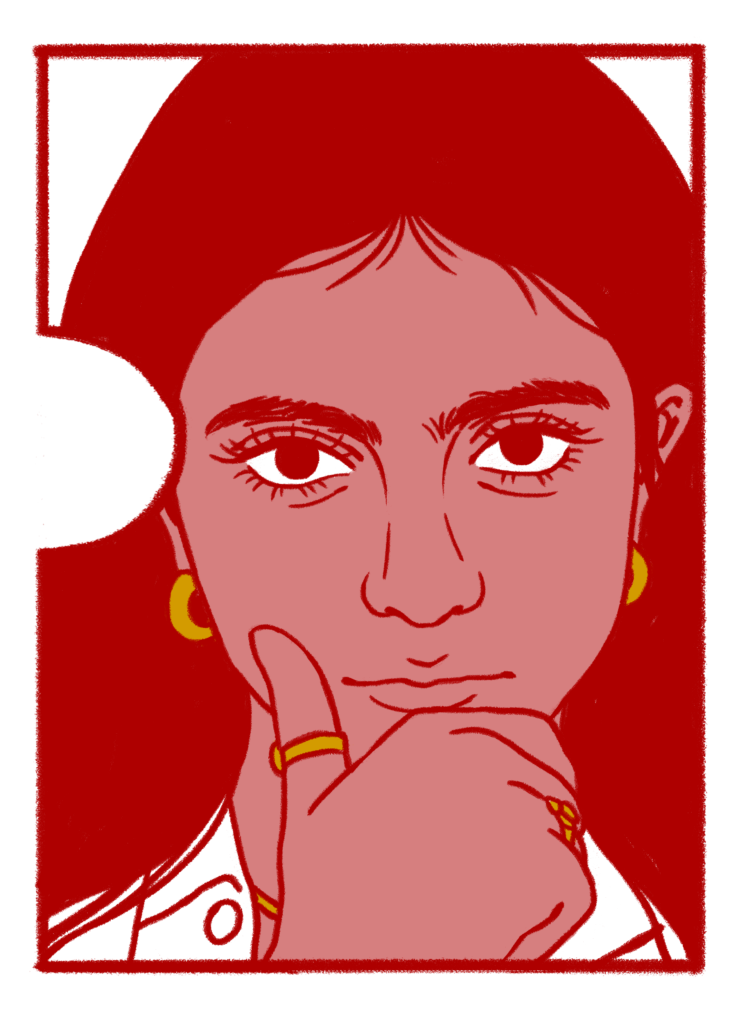
EG: Decolonizing the narrative is an everyday practice. Shout out Dr. Michelle R. Montgomery.
RL: I had so many thoughts after Atlanta. And part of it was because of social media. I am glad people are paying attention but it took so many deaths, hate crimes, and mass shootings for people to pay attention. That was really heartbreaking for me. In dance class none of the teachers talked about it at all. One of the other Asian students took it upon themselves to make space for all the Asian dancers to come and speak but then it became a thing where the faculty said “Oh we want to come to the meetings! We will send an email to everyone saying how you are creating this amazing space!”
EG: No. I am over any of that shit at NYU. They love to create platforms for traumatized bodies to fend for themselves and pat themselves on the back for it. And I’ll say that your relationship to March 16th is different from my relationship to March 16th, and Riya’s relationship, and Rajiv’s relationship. Even trauma is squished into a monolith.
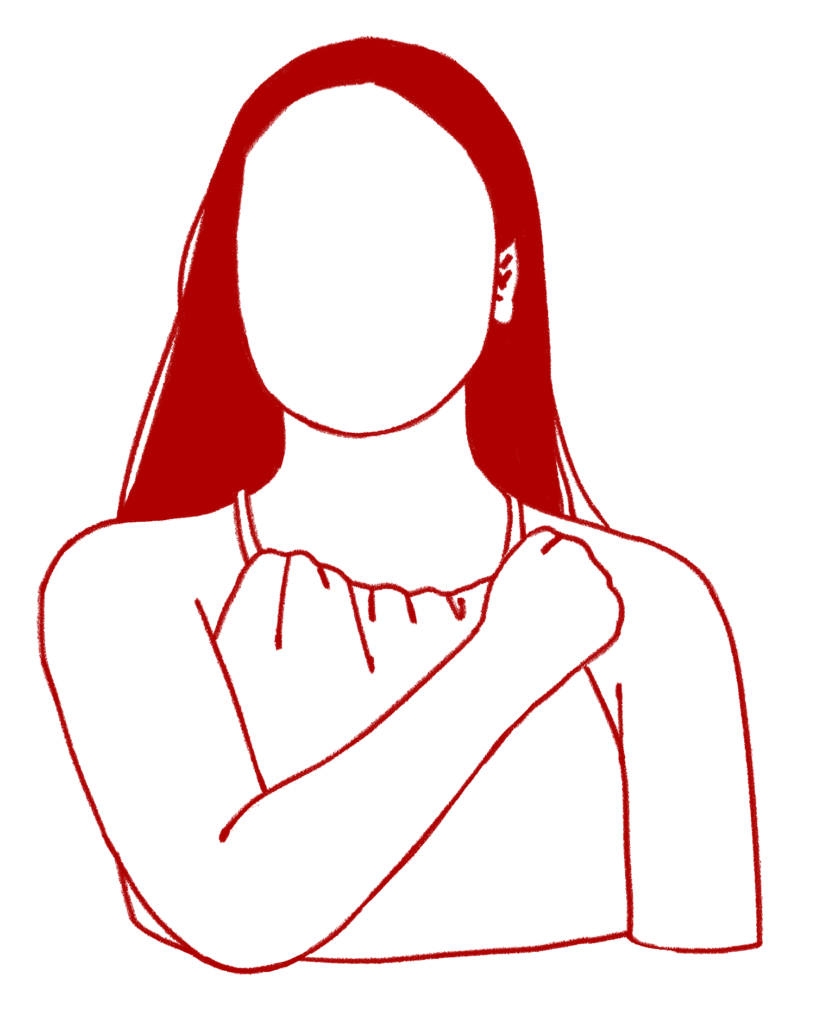
RP: The mass shooting in Atlanta left me feeling very heartbroken and frustrated, especially after everything we’ve been fighting for since last summer, and years prior.
EG: Same, the whole period after Atlanta personally hit me. Thinking about my relationship to the racist violence as a Southeast Asian woman, getting all the white guilt check ins, you know, just doing a lot of unpacking and racial healing. I was out for a couple days. And I felt very privileged to be in the position to say to my employers and say, I need a couple days. We need room in our workplaces and institutions to heal. And that is not built in as a priority.
RL: For sure. I am curious, since we are all in New York City, if others have felt this. Seeing that it was predominantly Asian women who lost their lives on March 16th, I was scared to do anything. I had one instance in particular a couple days after where I was meeting my friend at Veselka. There was this man standing on the street, he was staring at me, and started running towards me. It was for something behind me but I just saw this man running toward me. After that, I was trying to hide my Asianness while walking outside. Put sunglasses on, and wore a hat, because I was scared. When I look at myself in the mirror before I leave my house I notice myself. But when I leave my house and people notice me, they see, “oh she’s Asian.” I forget I’m Asian before I walk outside my door.
RP: Thankfully I haven’t experienced any of that overt racism over the past few months. However, I do have some close friends who were impacted by the rise in hate crimes, and I fear for their safety a lot.
EG: Especially being in NYC, having the biggest rise of hate crimes against Asians, even in a world where so many under-reported racist crimes against Asians exist.
RP: Yeah, it’s important to me that my friends and family are feeling okay, and it really does upset me that the pandemic has made this issue even worse.
RA: When I started really hearing about the spike in anti-Asian violence I immediately became super aware of anytime I saw Asian people walking down the street or like in the grocery store or something and it was almost as if I was mentally preparing myself to hit some motherfucker if he was gonna try shit. The other thing that happened was that I really had to start to reckon with the differences in how people view me as a South Asian and how they view East Asians and the nuances within those identities especially in a time where being brown and not stereotypically “Asian looking” is potentially shielding me from being attacked.
EG: Really thought provoking how colorism exists in this specific context.
RL: I have a lot of fear when it comes to coming forward but we are at this position where we just got to talk about it.
EG: Of course we as people who experience trauma need to heal, we shouldn’t beat ourselves up when we can’t stand up for ourselves. I think taking it day by day, joining in community with each other like we are right now, and talking about our experiences is powerful and supports that healing.
RP: Yeah, seeing the way our generation is working hard towards advocacy and equality gives me a sense of hope. I feel very moved by the way our communities are showing up for each other, and being the support system that we all needed over the past few months.
RL: Yes. That’s something I’ve definitely prided myself in the last year, having C.A.A.C. as a space to talk with people and heal with people. After Atlanta, I had people to talk to. For example, if this happened 4 years ago I would’ve felt super alone and not been able to speak about it.
EG: I feel that. And as much as it means for white friend groups to have a token friend of color, it also means a lot for that person of color to be a part of a white friend group.
RL: That’s true.
EG: What do you all hope for yourself going into post grad and life and the world?
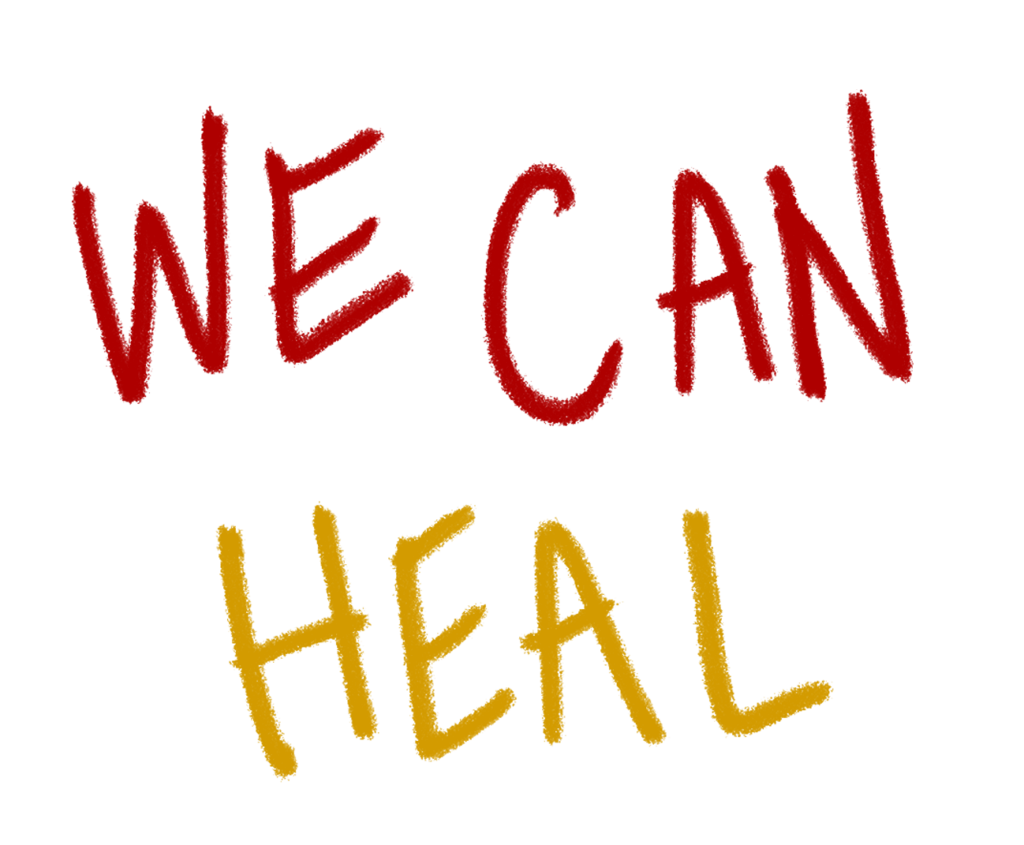
RP: I think a lot of people see art as a shortcut and do it because they think it’s just fun and they can find a way to make money out of it but there’s like no real passion there. I hope that I continue to find people and communities that really really care about what they do and really feel like they belong in that space is also important. I think I’m actively seeking out people who are just passionate about it and really want to make a change in terms of the way things are set up.
RL: Love that. I feel similarly. My skills and interests have broadened so much and I’m happy to do different things, but what’s important for me is to be a part of a company that works for something that I believe in. I’ve always wanted to create a platform for unheard voices. When I initially thought of unheard voices, for some reason I didn’t consider race as much. What I’ve realized in conversations about my identity is that I grew up feeling like I was the only one who was experiencing what I was experiencing. But that’s not the reality. I want to carve pathways for others to have conversations like these and not wait until they are my age to begin to accept who they are.
RA: Yes, I’m also thinking about the material that I engage with, the people that I engage with, how I’m engaging with the content, and the literal words that I’m writing as well. I’m also unearthing specific things that are Indian about me, I guess. Like going to the mandir, or my dad banging on the tabla, or we make chai every morning, instead of coffee. And things that are just like culturally specific.
EG: Damn y’all, thanks for sharing all that. For myself, I want to continue listening. I want to see emotion as strong and powerful. I want to read more. I want to consume more Filipina media and books. I want to be someone who is really specific with what they say and really specific with what they want, and encourage others to want that specificity for themselves. Within art, I have never seen myself as the biggest creator. I hope to learn how to flex that muscle and learn what it means to uphold equitable practices in the world of arts and entertainment. Lots of love and happiness. And health. Health is wealth.
Download FULL book here:
The Team:
Rajiv Awasthi (he/him) is an Indian American musician, actor, and writer. He recently graduated with a BFA in drama from NYU’s Tisch School of the Arts. His music can be found on Spotify and Bandcamp. His work, whether music or acting or anything else, is often focused on experimenting in new methods of creation and on finding the universal through the specific. One day he hopes to become a merchant fisherman.
Sally Chen (they/she/he) is a queer, non-binary, second-generation Chinese American illustrator and poet that makes work about intimacy, ideas of home, and identity. They’re based in Brooklyn, NY, and are currently pursuing a BFA Illustration and Psychology minor at Parsons School of Design. They’ve been published by Canto Cutie and LCC Theatre.
Tuânminh Albert Đỗ (he/him) is a multi-disciplinary artist from Warsaw, Poland. As the founder of Bai-Ka, he continues pursuing his company’s along with his personal artist mission to celebrate ancient traditions of humanity through common storytelling.
Emily Goes (she/her/any) is a Mixed Filipina performer, arts facilitator, community organizer, and now, filmmaker who strives to learn what equitable practices are in the world of art and entertainment. Emily graduated from NYU Tisch in the Spring and now works for Broadway Bound Theatre Festival and The CRAFT Institute. She is very grateful to be a part of this project and continue to use art as a weapon of liberation.
Rachel Ha-Eun Lee (she/her) graduated from New York University with a B.F.A in Dance and a minor in broadcast journalism. Born and raised in Dallas, TX, she attended Booker T. Washington High School for the Performing and Visual Arts. At Booker T. and NYU, she’s created works and has had the opportunity to work with choreographers such as UNA Productions, Banning Bouldin, Patricia Hoffbauer, Shamel Pitts, and more. Recently, Rachel was a part of the off-Broadway production of Oklahoma!, choreographed by John Heginbotham. Outside of dance, Rachel has illustrated and written for many publications and she is currently the Marketing and Digital Engagement Associate for Mark Morris Dance Group.
Han Lee (he/him) is an avid creator and consumer of underrepresented stories across media. A graduate of NYU’s Department of Media, Culture, and Communication, Han continues to navigate and shape the world of entertainment through his perspective as a young queer Korean American man. He is currently assistant to the co-founders of DIVE Studios, a K-pop focused podcast/digital production company. Born in Seoul, Han was raised and lives in Los Angeles.
Riya Panjwani (she/her) is an Indian-Muslim graphic designer and multi-media artist. Based in NYC, she has had a rich artistic upbringing, and has attended a performing arts high school at Frank Sinatra School of the Arts in Astoria, Queens, where she studied fine art. Since high school, she has dedicated much of her time to volunteering with various organizations and expanding her design skills. She’s been recognized by institutions like the Museum of Modern Art, where she has interned, displayed artwork, and spoken as a panelist. Riya is dedicated to her education in the arts, and continues to advocate for greater representation and diverse narratives in creative spaces.
Guru Ramanathan (he/him) is a versatile storyteller with ample experience in both the art and business of entertainment. He currently does brands publicity at ID, supporting an array of high caliber clients such as Nintendo, Peloton, the NAACP LDF, Reddit, and CORE. Outside of his role, he continues to produce new creative works, including an upcoming graphic novel magazine and his podcast The Passion Project. Having worked extensively on film, TV, podcast, journalism, and publicity projects in his career, Guru has brought diverse, impactful and thought provoking narratives to life across several sectors of the entertainment industry. He graduated from NYU’s Tisch School of the Arts as a University Honors Scholar and received the Dramatic Writing Award for Excellence in Episodic Writing by an Undergraduate.
